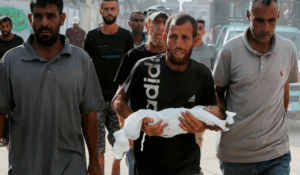In the not-so-distant future, Israel will have to reckon with its war crimes in Gaza

Palestinian father Fadi Al-Najjar mourns his three-month-old baby Yehia, who died due to malnutrition amid a hunger crisis, according to medics, outside Nasser Hospital in Khan Yunis, southern Gaza, 20 July 2025
Noa Sattath writes in Haaretz on 21 July 2025:
The ramifications of this war, a disaster of historic proportions, will take time to fully understand. But the day is not far off when Israel will have to start dealing with the war crimes its army is perpetrating in the Gaza Strip and try to recover its values and its morality.
The generations to come will have to pay the costs of the war. The physical reconstruction of Gaza will take years and will dog our children and grandchildren. A form of damage that’s less measurable but perhaps even more significant is the cheapening of human life.
Over the last 21 months – during which dozens of Gazans have been killed almost every day, many of them innocent civilians – the idea that Palestinian lives have value has been almost completely erased.
The concept of a social hierarchy and a web of negative stereotypes, both of which are meant to justify and enable the status quo of discrimination and inequality, are fundamentally racist.
The more unbridled the policy in Gaza has become, the less humane Israeli Jews’ view of Gazans has become, so as to enable these war crimes. Against the backdrop of the grief, trauma and anxiety that flooded Israelis after the massacre of October 7, 2023, racism intensified swiftly and sharply.
Gazans’ lives became less important than those of alley cats. Adult Gazan men aren’t even considered to be people who might be innocent, or whose lives have any value. The killing of women, children and even babies is consistently viewed as acceptable collateral damage.
This contempt is partly due to the extent of the killing and destruction and partly to the way the decisions are made.
The fact that the most important decisions about the war in recent months have been made by U.S. President Donald Trump – who talks about Gaza in an utterly cynical, ever-changing, random manner that depends on his mood, yet is determining the fate of millions – has reduced the concept of the value of human life to a meaningless, manipulative game.
This contempt for human life has a variety of potential costs. When Israelis forget that human beings live in Gaza – people with a history, heritage, values and desires – then ideas with no foundation in reality, such as voluntary population transfer, can sound reasonable and delay or even prevent realistic solutions.
When Israelis forget that human beings live in Gaza – people with multiple needs who seek an independent, dignified existence – then the solution of humanitarian aid in the form of truckloads of flour can seem like a reasonable alternative to rehabilitating agriculture so that Gazans could gradually wean themselves of the need for aid.
The dehumanization of Gazans is also leading to incidents of horrifying abuse of Palestinian prisoners (Gazans and others) in our jails. That’s because if people aren’t human beings, they can be starved, beaten and raped. The only requirement is that they be given a minimum number of calories per day.
On the utilitarian level, we also know that antidemocratic practices in the West Bank and Gaza – violence, racism and the absence of law – will over time seep over the border into Israel. If the norm of contempt for Gazans’ lives becomes entrenched, this will have implications for the value of life inside Israel.
But beyond any utilitarian cost, the price of contempt for human life is a moral one, and it’s immediate. Babies in Gaza have reached the point of starvation and even death because Israel hasn’t found a way to send baby food into Gaza, a mere 20 kilometers (12 miles) from Ashdod. That’s the reality. Perhaps it was once hard to fully understand it under the fog of war, but it is only becoming clearer. This is an intolerable situation, and we must not accept it.
We need a combination of forces to extricate ourselves from the moral abyss into which we have tumbled. We not only need a political leadership that isn’t afraid to tell the public the truth, but also functioning legal institutions. The latter – the prosecution, the attorney general and the courts – appear to have failed throughout the war and refrained from setting red lines.
We also need a media committed to the truth, one that shows the public the horrific incidents for which this government is responsible. We need an education system that isn’t afraid to teach our children to fight for democracy, humanism and peace instead of being preoccupied with the fanciful race to get into combat units.
We need courageous artists who aren’t afraid to write, create and show the public the truth through theater, poetry, museums and film as only artists can.
All of these institutions have been crushed and ground to dust during the almost three years that the most destructive government since the state was established has been in power.
Artists are intimidated, the opposition is guided by polls, cultural institutions are fighting for every shekel, and there’s no reason to waste words on what has happened to the prosecution and the courts.
But alongside a degree of understanding for the circumstances that have led to the collapse of all these glorious institutions, this is a wake-up call. Brush off the dirt and start rebuilding the foundations on which you stand. Show the public how far into the abyss we have plunged and propose alternatives to the bloodshed. A revival, funding and an end to the persecution you suffer will come only after that happens.
Noa Sattath is the executive director of the Association for Civil Rights in Israel
This article is reproduced in its entirety
